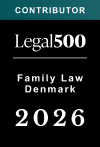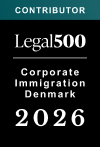
It is not possible to obtain Danish citizenship by descent in Denmark in contrast to many other countries. Unless you automatically became Danish by birth you can only obtain Danish citizenship by naturalization. This would normally require an address in Denmark in combination with a range of other requirement.
However, for a minor group of children (now adults) born by a Danish mother who did not automatically become Danish by birth due to the regulation in those days there is a shortcut for achieving Danish nationality.
This shortcut goes under the name “the princess rule”. It was given the name due to the way the rule came about. Princes Benedikte married a German prince. According to the citizenship regulation at that time children born in wedlock would only obtain their fathers’ citizenship. The princess Benedikte retained her hereditary right to the throne, but her children would not become heirs to the throne, because they would not become Danish citizens.
For her children to be able to achieve Danish nationality the parliament passed a bill allowing all children born between January 1st, 1961, and December 31st, 1978, by a Danish mother to apply for Danish nationality. If they applied by declaration before December 31st, 1981, they would become Danish citizens. However, the possibility was expanded for those who did not meet the deadline. They could apply for Danish citizenship by naturalization under less strict conditions comparable to those condition that was given for Benedikte’s two princesses.
Danish citizenship by naturalization
To obtain Danish Citizenship through naturalization the applicant must meet several conditions, e.g., pass a Danish test and a citizenship test. They must live in Denmark for a certain period. The application must be submitted to the Ministry of Immigration and Integration, who will review the application and then forward it to the Danish Parliament Citizenship Committee for final approval.
If the applicant meets the criteria and is approved by the committee, a bill regarding their citizenship must be passed, and afterwards the applicant must participate in a constitutional ceremony and shake hands with a public representative, for example a mayor. Only then the applicant becomes a Danish citizenship.
The princess rule makes an exception to the above mentioned, as the conditions for obtaining citizenship through the Princess Rule are less strict than the conditions for obtaining citizenship by naturalization.
When does the Princess Rule apply?
As mentioned, the rule only applies to children born in marriage between a Danish mother and foreign father between January 1, 1961, and December 31, 1978, and who were not granted Danish citizenship automatically by birth.
The Princess Rule applies to applicants born in this period, whose mothers did not submit a declaration for Danish citizenship on behalf of her children if the following conditions are meet:
- The mother was still a Danish citizen when the child was born and up until December 31, 1981, when the declaration could have been given.
- The applicant (the child) met the requirements for maintenance of Danish citizenship at the age of 22, if born abroad. This implies that the applicant must have some sort of attachment to Denmark either with a registered address in Denmark or a Nordic country for three months continuously or have had multiple stays in Denmark which sums up to at least 12 months stay.
Further requirements according to The Princess Rule
The requirement differs depending on whether the applicant lives in or outside Denmark.
The Princess rule for applicant living in Denmark
If the applicant lives in Denmark, he or she is exempted from the requirement of 9 years continuously residence in Denmark and do not need to meet the requirement of permanent residence permit. All other requirements must be meet which include the following:
- Sign a sworn fidelity and loyalty declaration towards Denmark and the Danish society
- Must declare to not have been found guilty of certain types of crime
- Cannot have any debt to the public authorities
- Must be self-sufficient which precludes the applicant from receiving certain types of government aid
- Must have had fulltime work for 3 ½ year within the last 4 years
- Must have passed a Danish test – level 3
- Must have passed the citizenship test
- Must participate in a constitutional ceremony
The Princess rule for applicant living outside Denmark
If the applicant lives outside Denmark, he or she does not have to meet any of the abovementioned requirement besides from signing a sworn fidelity and loyalty declaration, not been convicted of certain types of crimes, neither in Denmark or abroad, and cannot have any debt to Danish public authorities.
Instead of a Danish test the applicant must be capable of having a basic daily conversation in Danish and which will be evaluated at a Danish Embassy abroad.
The application process
The applicant must submit a naturalization application and pay a fee to the Citizenship office of DKK 4.000.
The processing time is for the moment between 17-22 months.
Holm/Thomsen Law is experienced in handling these cases and will give thorough guidance on the application process and the requirements that must be met. Do reach out to you if our assistance is needed.


